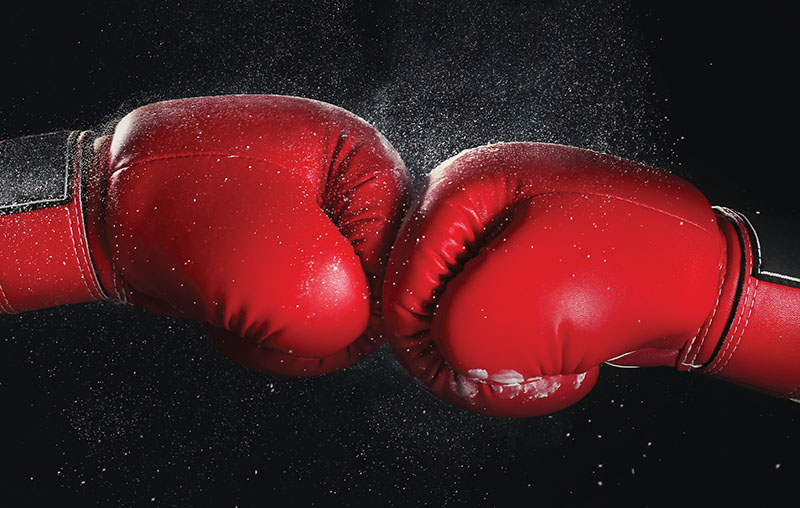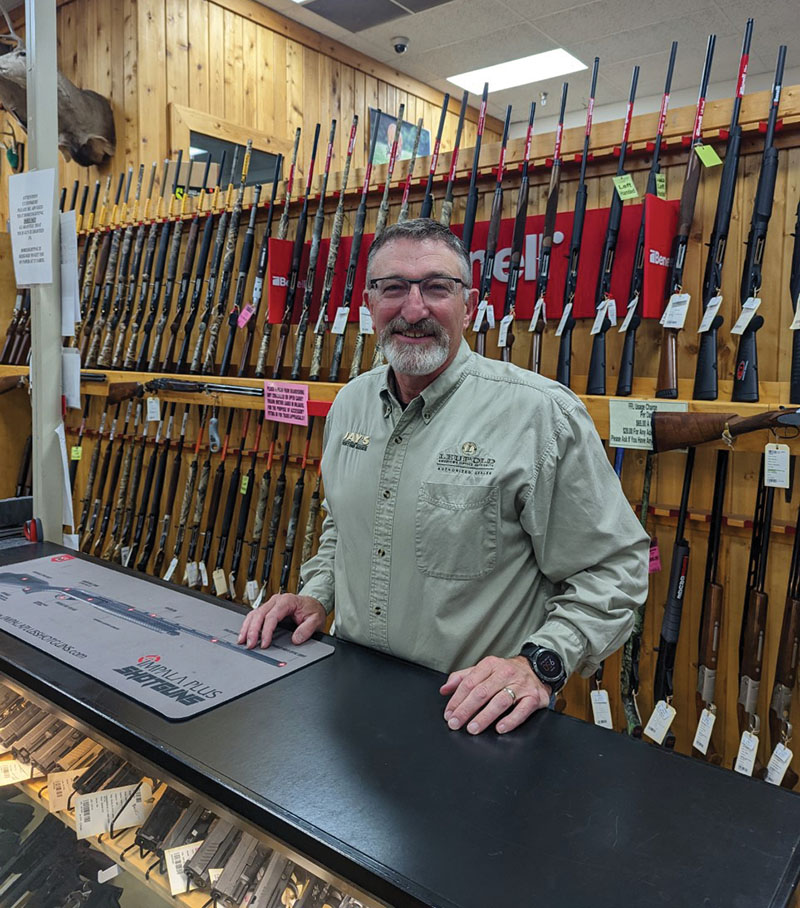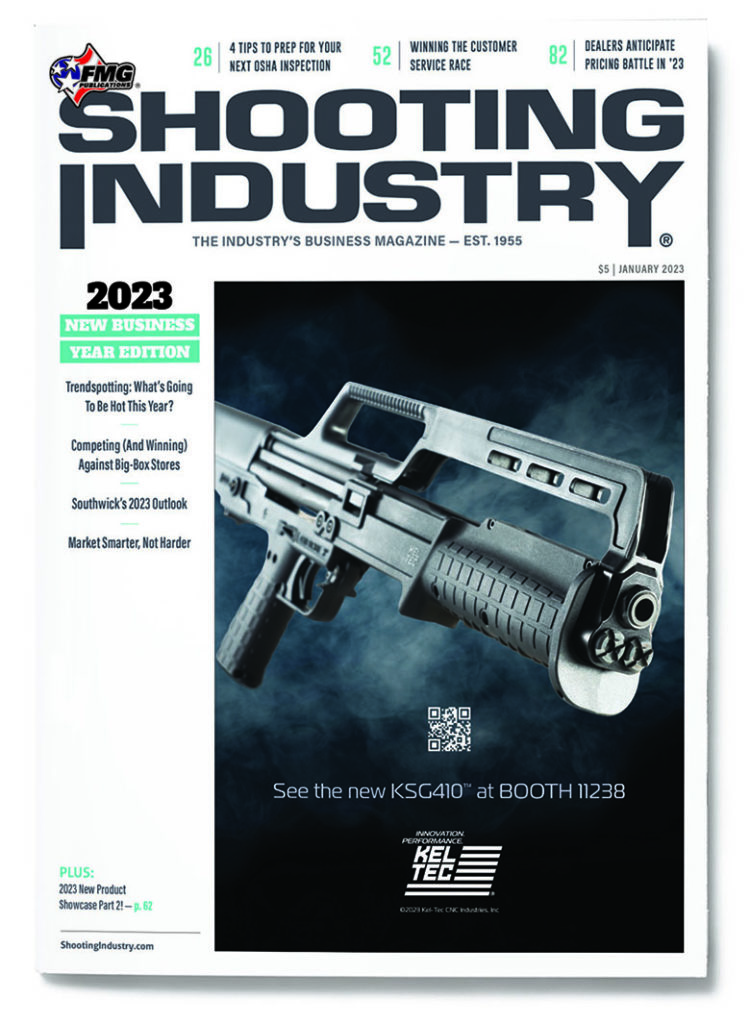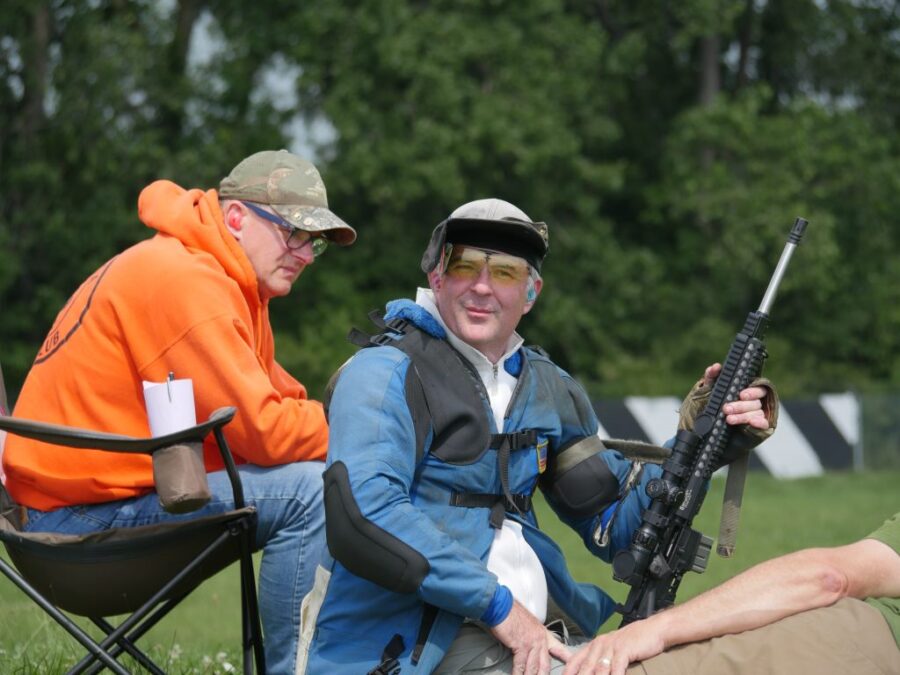Outbox Big-Box Stores
Independent gun stores have always been the backbone of the shooting sports industry. Generations of hunters and shooting enthusiasts depended on their local gun shops for firearms and ammunition, shooting accessories and gear, trustworthy advice, training and more. Despite the rise of big-box chains and online competition, storefront firearms dealers across the country continue to thrive.
How are mom-and-pop gun stores successfully competing with the large chains and online retailers? Which marketing channels and tactics are giving independent dealers an edge? What role does the in-store experience complete with in-person customer service play?
To get answers to these questions and more, we spoke with Jeff Poet, president of Jay’s Sporting Goods in Clare, Mich.; Larry Hyatt, owner/president of Hyatt Guns in Charlotte, N.C.; and David Rich, owner and lead instructor at Naples Gun Shop & School in Naples, Fla. Miles Hall, industry consultant with Hall-N-Hall consulting, also weighs in to share proven tips and advice that has helped countless gun stores.
SI: How much competition does your store get from big-box chains and online retailers? How much of a threat are big boxes and online competitors?
Rich: We get a lot of competition from the big-box stores, and much more from the online retailers. The online “shops” seem to make their profit from high volume, low-price sales and drop ship directly from the distributors. This minimizes their overhead as many don’t have the costs of keeping inventory, lease or building costs, higher insurance rates, etc. We regularly have customers wanting us to price match some online store selling the same firearm as us, but at $10 over cost. If we did business like that, our costs would quickly overrun our profit, or lack thereof.
Hyatt: Big-box and online retailers remain a threat to small businesses like ours. It’s important for us to understand the advantages of big box/online in the market and use our own advantages to counteract them. It’s a tough job, and it keeps us very busy.
Poet: We get a fair amount of competition from big-box chains because our size and selection come close to what they stock. I believe today everyone gets a significant amount of competition from online. Both are as much of a threat as you let them be to your business.
Hall: All retailers are impacted by big-box locations. The reason is they are less intimidating to guests who simply feel they know what to expect as they walk in compared to a frontline dealer they have not been to yet. The unknown is a challenge, if you will.
SI: What’s your secret to success against big-box and online competitors?
Hyatt: Customer service and product knowledge are our advantages over the big-box stores and online competitors. Most of our competitors in this space provide little in the way of customer service and many big-box stores move their employees around quite a bit. We like to say, “Do you want to buy a gun from a guy who was selling fishing gear last week?” In the online space, we learned early on many of our online competitors didn’t even return emails. So, we return emails, we return phone calls, we list our phone number prominently on our website, we process orders quickly and we always err on the side of customer satisfaction.
Poet: Giving our customers the best possible experience is the best defense to those competitors. Taking care of the customers coming in the door is paramount. There’s a reason why they are coming in our store. We need to meet those expectations and not give them a reason to shop elsewhere.
Rich: In-person customer service, and the bonus with the correct licenses, the customer can have the firearm today, versus four or five days from now.
Hall: Service, smarts, smile, sincerity.
“Focus on what you do well and make it better. Know where those competitors are, but don’t be consumed with where they are priced. Focus more on what the customer is expecting from you and do all you can to provide it. ”
Jeff Poet, President
Jay’s Sporting Goods • Clare, Mich.
SI: How important is marketing to competing against big-box and online retailers?
Poet: Marketing is very important and we spend a fair amount of dollars in the arena. We need to be visible and the first thing they think of when they make the decision they need something.
Rich: It’s tough. As a small business, we don’t have the ability to run ads on major TV networks. What makes it tougher is Facebook and Google restrict our ability to pay for advertising on their platforms. They won’t even let us pay to advertise firearm safety classes.
Hyatt: Marketing is extremely important, whether it be keyword marketing on our internet properties, social media or the few outlets we have for advertising. Unfortunately, big-box stores have a huge advantage here because they can use many of the channels that don’t allow gun advertising.
Hall: Critical. You are building a story and an image. The better and more you do it, the less important big boxes and online are.
“We learned early on many of our online competitors didn’t even return emails. So, we return emails, we return phone calls, we list our phone number prominently on our website, we process orders quickly and we always err on the side of customer satisfaction.”
Larry Hyatt, Owner/President
Hyatt Guns • Charlotte, N.C.
SI: Which marketing channels and tactics work best for your store?
Rich: We pay for indoor billboard advertising. We have a 20-second ad that runs in something like 20 local businesses such as gyms, car washes and other venues. Per Facebook and Google, we’re not allowed (by them) to pay for any advertising, so we rely on good Google reviews and folks sharing whatever we post on Facebook.
Hyatt: Email marketing is our number-one channel. We’ve been gathering emails for a little over 15 years and the effect of our email blasts are nearly immediate. We’re fortunate to have someone in charge of this who had many years of experience in event email marketing, so his work has been key to this success.
Poet: Even though we use most channels, we have shifted a lot of our budget to digital marketing. We try and customize by physical region and lean heavily on our own organic lists to target customers.
Hall: This varies around the country, but TV is still the go-to best bet. Social media today is TV on a more personal level. So, modifying the spots to impact the specific audience is doable.
SI: How important is the in-store experience for your customers?
Hyatt: It’s the most important aspect of our business. We did a study many years ago with one of our part-time employees. He traveled all over the country with his full-time job and made it a point to visit every gun shop he could. His experience with rude “gun shop attitudes” led us to double up on our efforts to greet people warmly and provide them the best customer service possible. We hire and train people who are already well-heeled in the gun industry, so their knowledge helps us to provide factual information to our customers. Plus, I’m always walking around the store and checking on customers. This is not a business for absentee owners.
Rich: Vital. It’s that’s simple. Many customers tell us they simply “want a gun,” with little or no other knowledge about what they want. Our face-to-face interaction gives us the opportunity to direct them to something that may be better for them and their intended use.
Poet: In-store experience is very important because it give us a first impression with our customers and it’s what can separate us from the competition.
Hall: Critical. The customers are actually your guest. You invited them in so make it great and memorable. Treat them well and they will do the same. The team with a servant’s heart, the spirit and who look sharp is in keeping with what makes frontline dealers the leaders in the industry. Oh, and you make more money, too.
SI: What’s your approach to your store’s layout and displays?
Poet: We try and merchandise strategically so whatever is in season we have front and center as soon as our customer comes in the door. We try to set the tone with thought-out, quality-looking displays. We keep some of this space “free” so no one category owns it and it allows us to change things quickly and often to give a fresh look each time a customer comes in.
Rich: Not sure if it sets us apart, but we strive to keep the store clean and professional-looking. We get compliments on our store and inventory regularly.
Hyatt: Merchandising is really an art form and we’re blessed to have a creative staff. Our store is a bit old and dusty, but it’s really part of our charm. We display as many guns as possible and this really sets us apart from other stores. We carry significantly more inventory than most shops, even the big-box folks, and I think it really sets us apart.
Hall: Eye level, easy to read and see. The better, cleaner, professional and inviting, the better your sales.
SI: Do the brands you carry help make you more competitive against big-box and online competition?
Hyatt: Absolutely. We like to position ourselves as a “gun specialty store,” so this means we carry a lot of brands many stores cannot afford. For example, we try to carry a large number of left-handed guns. This helps us to serve a part of the gun-buying public many stores forget about.
Poet: We put an emphasis on those who give us special support and try to keep us competitive with those competitors. This emphasis focuses from placement in the store, to width and depth we purchase from them.
Hall: Yes! Big boxes only carry a set or formula they think works. Frontline dealers are the only ones who truly bring the industry to the world. Big boxes live off of it and add little to it.
SI: What manufacturers do a good job supporting the storefront dealer with point-of-purchase displays or employee education and reward programs?
Rich: Some do, others not so much. GLOCK is great at offering armorer and other classes to employees of stocking dealers. Smith & Wesson recently began a program to reward store employees with a free firearm with so many sales, as well as a discounted handgun.
Hyatt: Springfield Armory is number-one in this. First off, Springfield offers an exemplary product line that covers nearly every facet of the gun space. Springfield also has an excellent training program and its rewards program is second to none. Sales associates are more likely to push Springfield for these reasons and it’s one of our best-selling brands every year.
Poet: The optic vendors we have probably focus the most on POP/education/reward programs. It does tend to be those manufacturers that have higher technical products and need the details explained.
Hall: Lots of manufacturers now offer such things. For special items, giveaways, help with advertising funds you need to ask. We found presenting the plan and expectations was key to their support. Ask and you may just get it.
SI: Do MAP policies help your business?
Poet: Absolutely MAP pricing helps if the MAP gives a decent margin. If it doesn’t give a decent margin, it can hurt as much as it helps. Most of the time we just want a level playing field and we feel we can add value to the product with our staff or processes.
Rich: Absolutely! Enforced MAP policies help level the playing field with online-only companies.
Hyatt: We’re big fans of MAP policies if they are enforced. Many manufacturers with a MAP policy don’t do a very good job of enforcing violations and it puts us in a conundrum. Obviously, we have to follow market forces when it comes to pricing and if several dealers are putting out pricing below MAP, we have to follow suit.
Hall: You bet it does. Look for and support those companies that do and enforce MAP. They truly understand the big picture and care for the frontline dealers.
SI: What advice would you offer other retailers for beating big-box and online competitors?
Hyatt: Put your customers first. We’re in the customer service business as well as the gun business. Communicate with your customers, give them a great experience and they will usually come back to you, even if your price is a little higher.
Poet: Focus on what you do well and make it better. Know where those competitors are, but don’t be consumed with where they are priced. Focus more on what the customer is expecting from you and do all you can to provide it.
Rich: This is a tough one. The online social media presences have targeted the brick-and-mortar stores, yet allow the big-box shops to advertise. The best we can work toward is a good customer experience in our store that hopefully will lead to a lot of personal recommendations to our store.
Hall: Work to become the easy-to-get-to, easy-to-talk-with and easy-to-buy-from store. Coupled with the right spirit and servant’s heart, you will be the center of the shooting sports world in your area.







